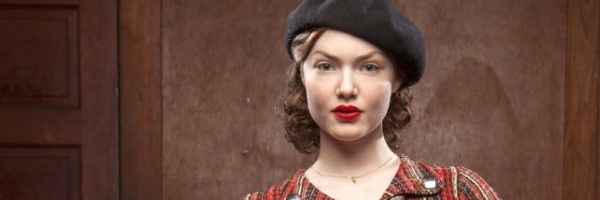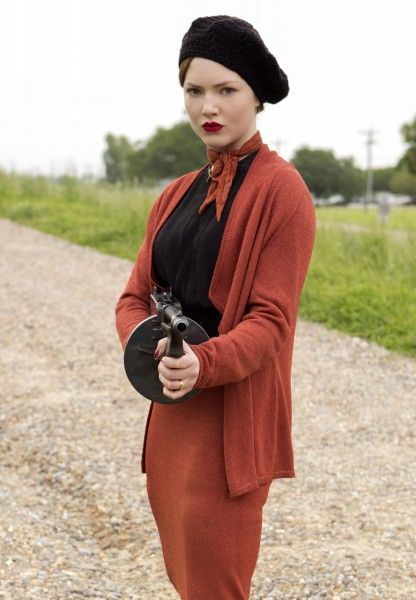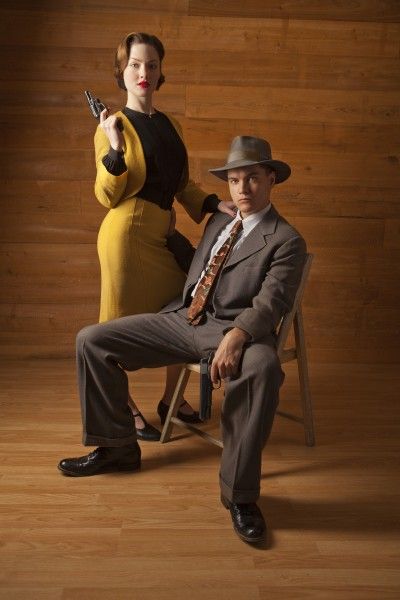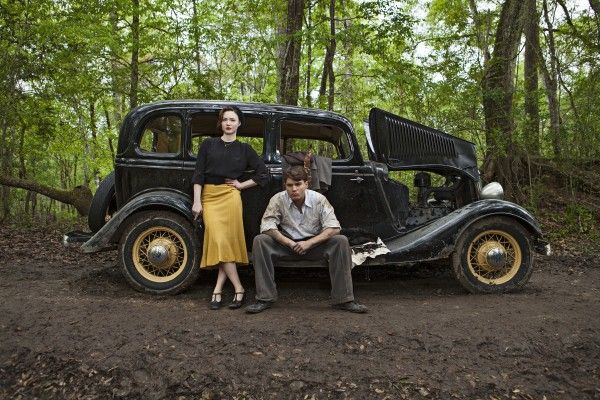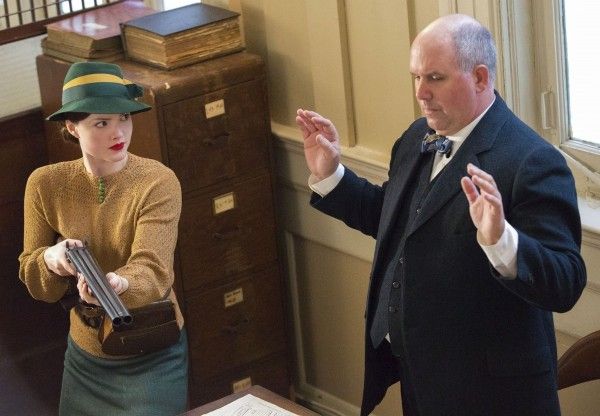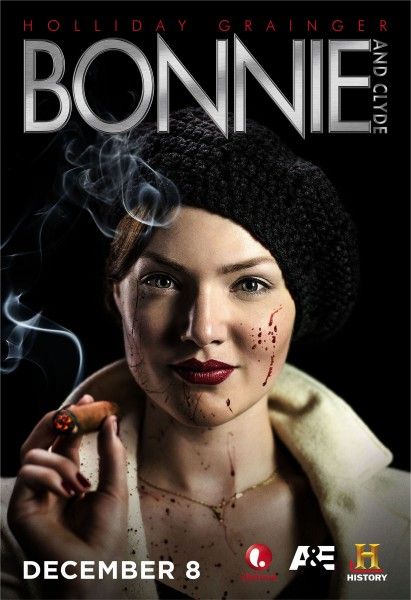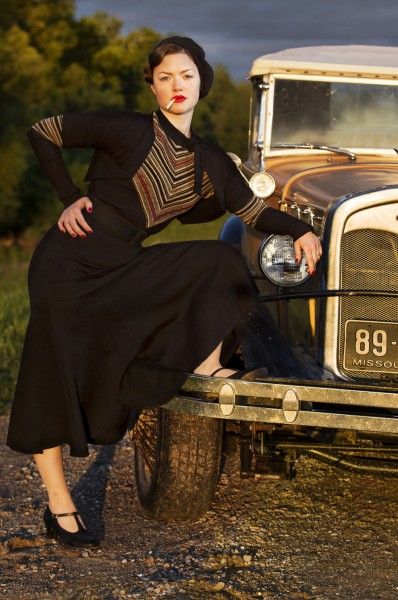In this special two-night, four-hour event that’s airing simulcast on A&E, History and Lifetime, Bonnie & Clyde retells the fascinating tale of the legendary couple whose crime spree enraptured the American public. Directed by Bruce Beresford (Driving Miss Daisy), Clyde Barrow (Emile Hirsch) and Bonnie Parker (Holliday Grainger) were able to stay one step ahead of the law and escape capture, time and time again, which led to riskier and more dangerous crimes, making them the most famous criminals of the modern era. The film also stars Holly Hunter, William Hurt, Sarah Hyland, Lane Garrison, Elizabeth Reaser, Austin Hebert and Dale Dickey.
During this recent exclusive interview with Collider, actress Holliday Grainger talked about how she won this role from an audition she put on tape, what she most loved about this script, how she viewed Bonnie Parker, how she found her performance, working with her partner-in-crime Emile Hirsch, having such a beautiful wardrobe, and just how bizarre it was to film Bonnie and Clyde’s fatal final shoot-out. She also talked about playing one of the evil stepsisters in Kenneth Branagh’s Cinderella and feeling like they’re making a fairy tale come to life, as well as how she misses being a part of the Showtime series The Borgias, in which she played Lucrezia. Check out what she had to say after the jump.
Collider: How did you come to be a part of this? Was this a role you had to audition for?
HOLLIDAY GRAINGER: It happened shockingly quickly. It was my first project that I’ve ever gotten from a tape. I’m so used to taping myself and sending it off and never hearing back. I started to believe that nobody actually ever sees my tapes, apart from my agent. And then, I got a phone call saying, “They liked your tape. Can you put yourself on tape again, for the other scene that you never got around to doing?” I was like, “Yeah! Wow, someone actually watched it and liked me? Amazing!” It was the best script I’d read in ages. And then, I Skyped with (director) Bruce [Beresford] for five or 10 minutes, and got the part the next week. I was really freaking out because I hadn’t met anyone. I was like, “You’re trusting me to play an American icon, and you’ve not actually met me?” He’d only seen my audition tapes. It scared me. I was like, “Are you going to get me a dialect coach?,” and they were like, “Yeah, when you get over here.” So, I was like, “I’ve gotta get my own dialect coach.” I completely freaked out and took myself to ballet lessons and started researching panic attacks. Everyone was like, “You can start prep when you come over, in a few weeks.” I just dove into Bonnie Parker, head first.
Once you did get to meet Emile Hirsch, did you breathe a sigh of relief that things would actually work?
GRAINGER: Yeah! I was in Louisiana for five days, before any of the other cast arrived. I met Emile and we were on the same wavelength about it. And then, I met Holly Hunter, as well. My first scenes were with her, and she was just so generous and so lovely. She really held my hand through it. She could tell how nervous I was. She said, “You know, you’re doing great.” She really put my nerves at rest. I started to enjoy it, from then on.
When you read this script, what most stood out for you?
GRAINGER: I loved the surreal elements that were in the script, and the way that it dances around and between present and pasta. And the fact that Clyde has second sight was something that I read into in biographies and thought it was really interesting to play on that. I very rarely want to play a character that I don’t like, but after reading the script, by the end of the script, I hated her. I just thought she was the most thick-skinned, selfish, manipulative little bitch, every. She was like a selfish little teenage girl, in adult form. She was fame-hungry and self-centered. It all was so complex, with her desires and her need for recognition and her need for something more out of life. And then, when I started reading more about her in biographies, and reading about the era and being a product of the Depression, there was no hope in a small suburb of Dallas. There was nothing beyond waitressing or secretarial work, if you were lucky. This girl really took her life into her own hands and really did something with it. I was intrigued, as well, with her diary entries and her letters to Clyde, when she was younger. There was a totally different side to this manipulative woman that was in the script. She was quite a naive young girl. It was that juxtaposition that really intrigued me.
With as much as Bonnie enjoyed the fame and celebrity, she probably would be someone who would love to be a reality star today?
GRAINGER: Exactly! It’s like she was the original fame-hungry reality star. She would have loved to have gone on Pop Idol, or something like that.
Were you ever hesitant about taking on this story and this character, knowing that these are not just historical figures, but that they’re cinematic icons, too?
GRAINGER: Gosh, no! I think I’m a bit like Bonnie, in that I’m selfish when it comes to work. I’m like, “Oh, that will be fun! I wanna do that!” I never think beyond my participation in a project. It’s never something that plagues my mind when I’m working on something. And then, I finish and I’m like, “Oh, yeah. I hope people agree with my version.”
When you were doing your research for this, were there specific things you read about Bonnie that helped you find how you wanted to play her and how you wanted to carry yourself, physically?
GRAINGER: The Bonnie that I created in my mind from biographies that I’d read, and then from the script, seemed like two totally different people, so I went with the Bonnie in the script because I thought she’d be more interesting to play. Also, of course, we’re making a TV show and not a documentary. But, what I did take from reading her diary entries was that element of innocence and this need to be liked and wanted. She needed to be liked by her mom. She needed to be liked by Clyde. She needed a guy in her life to follow. She needed to be liked by the public. She was so distraught that people would think she smoked cigars. They took a police officer hostage and the one thing that Bonnie asked him to do, when they let him go, was to tell the world that she didn’t smoke cigars. She cared about her image. She had this innocence and naivete, and then this aesthetic preoccupation for such a young girl.
How did you approach acting out the panic attacks to make them as realistic as possible?
GRAINGER: I thought I should look in the mirror, but every time I looked in the mirror while I was doing it, I just thought it all looked horrendous. I spoke to friends that have panic attacks, and I spoke to a doctor who has panic attacks, himself. I also did a bit of research into them. It seemed like everyone’s version of a panic attack had slightly different physical things. So, I decided to choose my own physical things. And then, I related that to what I do, whenever I’ve felt panicked or anxious in my life, and just tried to exaggerate that feeling with the physicalities. I also sat with Holly [Hunter] for awhile and we went through mechanisms that might have been good for her mother to bring Bonnie out of the panic attacks. I freaked out after the first time I did the panic attack, but Bruce told me that it was utterly believable. That was the nicest feedback he gave me after a scene, so that was good.
What was it like to work with Emile Hirsch on this? Does it feel like you’re partners in crime, when you’re doing such intense work together?
GRAINGER: Yeah, especially when you’re on location. We were on location in Louisiana for three months, and in Nowheresville, Louisiana for quite a lot of it. It’s always very intense because you spend so much time together, and so much time together, in the mind-set of Bonnie and Clyde. You finish work so late, and then you sit over dinner, going through the scenes for the next day, and there’s no breaks in the character, really. It feels like you’re constantly working on it, thinking about it, running scenes and talking about it. Bruce was quite open to us making little changes, as well, so it felt organic and very much our own.
How was it to wear this beautiful wardrobe while carrying around a shotgun and robbing banks?
GRAINGER: I love that juxtaposition. That’s who Bonnie wanted to be. She wanted to be this cool, glamorous fashion icon. The outfits were beautiful. Marilyn [Vance], the costume designer, did an amazing job. My trailer was plastered with pictures of the 1920s and 1930s front covers of Vogue, and Bonnie’s outfits were straight off the covers of Vogue. It was amazing!
We all know the fate of Bonnie and Clyde, so it’s not a spoiler to talk about how they died. What was it like to see your death scene? Is it just totally bizarre to watch yourself get all shot up and be all bloody like that?
GRAINGER: It was actually far more bizarre acting it out than it was to watch it. It was terrifying! I don’t think I’ve ever been quite so scared on a film set. Just a second before they said, “Action!,” Emil and I were sitting in this car with squibs all over our bodies and all over the car in front of us. There were hundreds of them. And then, the whole crew were like 10 feet away from the car, wearing protective masks and protective ear wear. And then, the effects guys were like, “Don’t worry! They don’t really hurt. Just make sure you keep your eyes closed and your skin away from most of them because they can burn.” Emile had just done this action war movie, called Lone Survivor, and he had witnessed a few people being hit by them. He just turned to me and said, “Make sure you shut your eyes. They do hurt.” And we knew they had one take. They took seven hours to set this car up, and we just had one take to go for it. It really felt like we were being executed. Emile and I actually held hands in the car.
What’s it like to go from doing Bonnie & Clyde to playing one of the stepsisters in Cinderella?
GRAINGER: I know! It’s so daft, isn’t it? It’s great! I had a little film in between, as well, to break me down. I went and played a contemporary Northern girl for a bit, in Posh. And then, I went on to play one of the stepsisters, which is quite silly comedy.
When you do something like Cinderella, do you think about the fact that you’re retelling the story of Cinderella, or can you focus on it as just another story that you’re telling?
GRAINGER: Whenever I walk out of my trailer and see Lily [James] in her costume, I think, “My god, I’m shooting Cinderella!” When she’s in her ball gown, she looks like the fairy tale version of Cinderella that you remember dreaming about, as a kid. The first time I saw her in her ball grown, I felt a bit starstruck. It’s just Lily. She’s one of my contemporaries. We’ve known each other from before. But when she’s in the Cinderella dress, she’s just perfect. That’s when you go, “Oh, my gosh, we’re actually making a movie! We’re making a fairy tale come to life!”
Just how nasty do these stepsisters get?
GRAINGER: Like anything, you’ve gotta find the humanity in the characters. I talked a lot about backstory with (director) Ken Branagh. I feel like they’re slightly emotionally stunted, like Bonnie, in a way. Anastasia is very preoccupied with aesthetics, and she’s quite emotionally stunted. I don’t think she realizes quite how selfish she’s being. She’s just this selfish little toddler.
With everything that happened with The Borgias, were you disappointed with the way the series ended, or did you feel a sense of closure with how the story concluded?
GRAINGER: It’s a shame that we didn’t get a chance to wrap it up. I think there’s an e-book on sale, with the final two episodes that (show creator) Neil [Jordan] was planning to do, so I want to read that, at some point. I was pleased that it didn’t go, in a way, because I could then do Posh and Cinderella. But, I miss it now. The last three years, I was there in Budapest with everyone, playing Lucrezia, and I just miss the lifestyle of it.
Bonnie & Clyde airs on A&E, History and Lifetime on December 8th and 9th.

